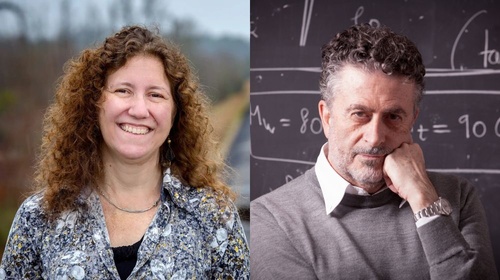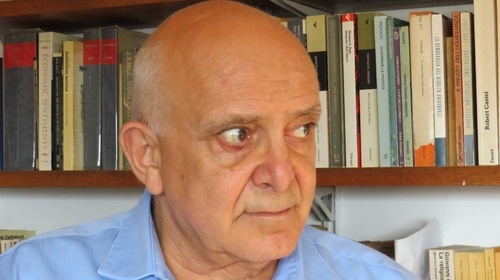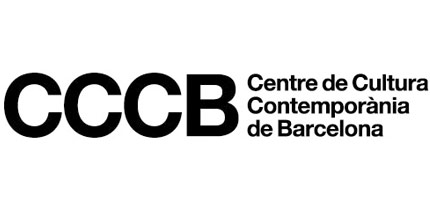(In)visibles cities
Spaces of risk, spaces of citizenship
Debate
On 25 July this year, the CCCB is organising a day of debate on the subject "(In)visible Cities: Spaces of Risk, Spaces of Citizenship" as part of the Centre's permanent work on public space. This session, too, will be the occasion of the presentation of the European Archive on Urban Public Space, a project headed by the CCCB in collaboration with The Architecture Foundation (London), the Institut Français d'Architecture (Paris), the Nederlands Architectuurinstituut (Rotterdam) and the Arkitekturzentrum (Vienna) within the framework of the GAUDI Programme, which is financed by the European Commission.
The Archive contains the urban planning projects that were presented for the European Prize for Urban Public Space, whose third edition will take place in 2004. The common feature of these projects is their concern, not only with the strictly urban planning aspects, but also with the recovery of public space in its civic and social senses. This session of debates will coincide with the Days of Dance Festival that is to be held in Barcelona and will include audiovisual projections and workshops with architects, choreographers and representatives of immigrant collectives in the city of Barcelona as participants. The full programme of project's events will take place between 25 and 27 July, transforming the CCCB and its surroundings into a setting for debate and cultural activities around the many dimensions of public space.
Aims of the debate
Taking the city not just as a physical space (urbs) but also as the domain in which democracy is specified and develops (civitas), the debate will analyse the tension between the risks (urban segregation, privatisation, chaos) and potentialities (modernity, citizenship, integration) that is inherent to public space and how this tension might affect the ideal of the open and democratic community of the modern city. Starting out from this duality, and returning to Italo Calvino's metaphor, the debate will take in many cities (real, ideal, imaginary, visible and invisible) to reach consensus on conclusions about the present state of public space from a multidisciplinary perspective. The debate will be markedly European in its focus, but will also include the standpoints of three other great cities (New York, São Paolo and Mumbai). The conclusions of the debate will be compiled in a document that is to become the point of departure for, and conceptual framework of, the European Archive on Urban Public Space.
Format of the debate
The main aim of the conference is to encourage in-depth reflection among urban planners, philosophers, geographers, architects and sociologists on the question of public space. The day¬long debate will be organised into four areas of discussion, each one of which will feature two guest speakers, who will give a synthetic overview of the theme, along with a number of respondents whose participation will consist of very specific accounts of their own experiences or opinions on the particular subject. Each panel will be presented by a local or European authority on the matter. Participants at the conference will include representatives of the leading architectural and urban planning institutions of the twelve European cities participating in the GAUDI Programme. Public attendance will be limited to people directly working on public space.
25 JULY
9.30 a.m. - 11.30 a.m. «Public Space and Modernity»
Transformations occurring in modern society have indubitably modified the concept of public space: urban and demographic growth, the revolution in communications and virtual reality are elements that have transformed urban life and the very idea of the city. What is left of the Greek polis? What can we say we understand by the notion of public space today?
Introduction: Josep Ramoneda, Director of the CCCB.
Presented by: Oriol Bohigas, Architect.
Guest Speakers: Olivier Mongin, Director, Esprit magazine. Alejandro Zaera, Architect, Dean of the Berlage Institute, Rotterdam.
Main respondents: Xavier Costa, architect, Director of Elisava, Universitat Pompeu Fabra. Ricard Gomà, Professor of Political Science at the Universitat Autònoma de Barcelona. Miquel Molins, Art Critic, Professor of History of Art at the Universitat Autònoma de Barcelona. Manuel de Solà-Morales, Architect, professor of Urbanism at the Escola Tècnica Superior d'Arquitectura de Barcelona.
12 noon - 2 p.m. «Projecting Public Space»
The recovery of public space has been one of the key elements for understanding urban planning in the city over the last three decades. Different models have been applied from more or less historicist standpoints, and more or less breaking with nineteenth-century urban planning traditions. Although results are now showing better urban integration in many cases, processes of specialisation are also detected, and an orientation towards consumption uses, or thematic divisions. The appearance of new styles of urban life and new forms of technology within the space of the city have also given rise to new potentials and risks when it comes to confronting the urban architectural project dealing with public space. What might be the elements that define architectural action in the sphere of public space in cities of the twenty-first century? What solutions might be offered by interaction between social thinkers and urban planners?
Presented by: Jean-Louis Cohen, Architect and Director of the Institut Français d´Architecture (Paris).
Guest Speakers: Raymond Gastil, Executive Director of the Van Alen Institute, New York. Jan Gehl, Architect, Professor of Urban Design, and Director of the Centre for Public Space Researchat the School of Architecture, Royal Danish Academy of Fine Arts, Copenhagen.
Main respondents: Aaron Betsky, Director, Nederlands Architectuurinstituut (Rotterdam). Eduard Bru, Architect, Professor at the Escola Tècnica Superior d'Arquitectura de Barcelona. Juan Eduardo López, Director of the Dancing Days Festival. Teresa Tapada, Social Anthropologist, Professor at the Universitat Autònoma de Barcelona.
3:30 p.m. - 5:30 p.m. «The Limits of the City? Urban Models and the Worldwide Expansion of Urbanization»
Over the last two centuries, the growth and spread of urban space have come to represent an uninterrupted process with a very significant result: the city has ceased to be an exception within non-urbanised territory, to become what it is today - the main characteristic of inhabited space. In Europe, urban territory appears as a mesh where the non-urbanised, or natural, spaces that prevailed in the past, have now remained as captive spaces surrounded by urban areas, infrastructure and buildings. With this tendency to a dispersal of urbanisation, settlement and activities, the limits of what is urban have been configuring a range of metropolitan spaces of variable extension, integrating different places and landscapes: some that are more urbanised and others that are less built up. This is a city that has spilled out over the territory and that now puts into question archetypical urban models such as the "European city", the "American city" and the "Mediterranean city".
Presented by: Josep Maria Montaner, Architect, Professor at the Escola Tècnica Superior d'Arquitectura de Barcelona.
Guest speakers (confirmed): Lila Leontidou, Dean of the School of Humanities and Professor of Geography and European Culture at the Hellenic Open University (Athens). Luca del Pozzolo, Deputy Chairman and Research Director at Fondazione Fitzcarraldo, head of the Scientific Board at the Piedmont Cultural Observatory, Architect and Professor at the Faculty of Architecture, University of Turin.
Main respondents: Dietmar Steiner, Director, Arkitekturzentrum Wien. Bashkim Shehu, Albanian writer resident in Barcelona. Stuart MacDonald, Director of The Lighthouse, Glasgow.
6.00 p.m. - 8.00 p.m. «The Limits of Democracy? The Megalopolis: the Space of Risk vs. the Space of Citizenship»
By the middle of this century, cities like Mumbai and Tokyo will have more than thirty million inhabitants. Urbanisation seems to be an unstoppable process, with serious political and social consequences (exclusion, fragmentation, overcrowding) that make it increasingly necessary to think about the need for collaboration between the social thinker and the urban planner. With the challenges now being raised by the megalopolises, new voices have appeared seeking ways of democratising the city and reinforcing locally based power. When does the city cease to be a space of democracy to become a space of exclusion? Are the limits of the city the limits of the democracy?
Presented by: Francesc Muñoz, professor or Urban Geography at the Autonomous University of Barcelona.
Guest speakers: Himanshu Burte, Indian Architect, co-founder of the Architecture Forum at the National Centre for thePerforming Arts (Mumbai), member of PUKAR (Partners of Urban Knowledge and Action Research). Teresa Caldeira, Professor of Anthropology, at the University of California (Irvine), and at the Universitade do Estado de Campinas (UNICAMP, Brazil).
Main respondents: Jordi Balló, writer, Professor of Audio-visual Communication at the Universitat Pompeu Fabra. Juan José Lahuerta, Architect, Professor at the Escola Tècnica Superior d'Arquitectura de Barcelona. Rowan Moore, Director, Architecture Foundation (London).
Pep Subirós, Philosopher and writer.
Special Guests: Berlage Institute (Rotterdam) Institut Français d'Architecture (Paris), The Architecture Foundation (London), Centre International pour la Ville, l´Architecture et le Paysage (Brussels), Istituto di Cultura Architettonica (Rome), Museum of Finnish Architecture (Helsinki), Direction de l'Architecture et du Patrimoine (Paris), Hellenic Cultural Heritage (Athens), Deutsches Arkitektur-Museum (Frankfurt), AchitekturZentrum (Wien), Dansk Arkitektur Center (Copenhagen), Nederlands Architectuurinstituut (Rotterdam), The Lighthouse (Glasgow), Fundació Mies Van der Rohe (Barcelona).
Presenters: Oriol Bohigas, Jean-Louis Cohen, Josep Maria Montaner, Francesc Muñoz
Participants: Olivier Mongin, Alejandro Zaera, Raymond Gastil, Jan Gehl, Lila Leontidou, Luca Dal Pozzolo, Himanshu Burte, Teresa Caldeira, Ricard Gomà, Miquel Molins, Manuel de Solà-Morales, Dietmar Steiner, Aaron Betsky, Eduard Bru, Juan Eduardo López, Stuart McDonald, Bashkim Shehu, Jordi Balló, , Rowan Moore, Josep Subirós (see Pep Subirós), Josep Ramoneda
![[Undefined key: peu_imatge_default_debats]](https://www.cccb.org/public/img/default/default_debats.jpg)



